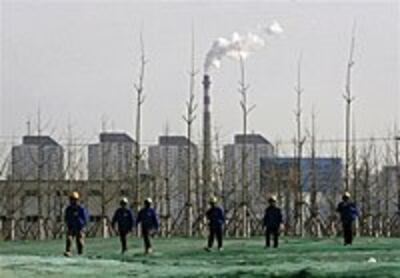
As China struggles to control pollution, officials have uncovered a new problem: local governments have been falsifying environmental reports.
In a surprising statement Dec. 28, China's State Environmental Protection Administration (SEPA) was quoted by the official Xinhua news agency as saying that "environmental statistics released by some local governments are false, and local pollution indices have been fabricated."
SEPA said it discovered discrepancies when compiling data from 26 regional authorities to determine whether the central government’s goal of reducing pollution by 2 percent last year had been reached. Pollution reported by local governments “dropped remarkably” last year, but “the real environmental situation continues to deteriorate,” SEPA said.
SEPA will send working groups to the provinces to check the statistics, according to Xinhua.
The good news is very positive, in that there seems to be an increasing concern on the part of many Chinese that environmental pollution is out of control and needs to be reduced.
In interviews with Radio Free Asia, experts voiced shock at the use of phony data but offered praise for China’s decision to publicize the problem.
Local officials “under pressure”
William Chandler, a China environment expert and adjunct professor of international policy at the Washington-based Johns Hopkins University School of Advanced International Studies, said that local government officials are “under pressure to produce data which are rosier than are warranted.”
Chandler, who is also president of Transition Energy, a clean energy investment firm that operates in the United States and China, added that local officials often lack the power to make pollution control a reality.
“The good news is very positive, in that there seems to be an increasing concern on the part of many Chinese that environmental pollution is out of control and needs to be reduced. The bad news is that there’s a disconnect between the people who have the authority to reduce emissions and those who have the responsibility to reduce emissions.”
Daniela Salaverry, a China program associate at Pacific Environment, a nongovernmental organization based in San Francisco, said that SEPA’s weakness as a central government agency is at fault. SEPA is not seen “as a strong government agency,” Salaverry said.
“So I can imagine that at the local level, people feel like they don’t necessarily need to take it seriously, which might be another reason for these falsified reports.”
Salaverry added that worldwide focus on China’s pollution problems makes it difficult now for the central government to ignore flagrant abuses like fabricated reports.
“And so I think it’s a good step that they’re acknowledging and making it public that those reports were falsified, and that they’re going to go back and try to re-collect data on these types of things,” she said.
Issues debated in press?
William Chandler said that Chinese press coverage of the fabricated reports suggests that a recent government announcement of a more open press policy may be taken seriously. “Recently, I have seen more than one side of an issue presented in the press,” he said. “It’s almost as if some issues are being debated and fought out in a relatively public way.”
In December, China announced a termporary easing of limits on foreign journalists for the period leading up to the 2008 Olympic Games. The new freedoms—including travel within the country and interviews without prior government approval—follow concerns that a September announcement of reporting restrictions could hinder foreign coverage of the Olympics.
Daniela Salaverry voiced hope that the central government and local authorities will extend the policy to allow citizens’ groups to report pollution problems and demand enforcement of environmental regulations.
“It’s the people, it’s the public who are bearing the burden. And whether or not they’re organized and officially registered or just a community group, these groups are developing and trying to act as watchdogs to local government.”
“It’s really critical to support that,” Salaverry said.
Original reporting by Michael Lelyveld. Edited for the Web by Richard Finney.
